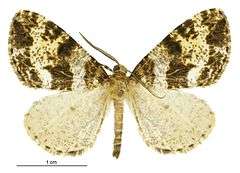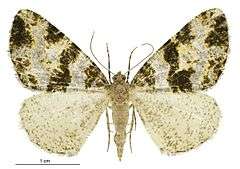Pseudocoremia albafasciata
Pseudocoremia albafasciata, also known as the flash moth, is a species of moth in the family Geometridae. It is endemic to New Zealand. It is classified as Nationally Endangered by the Department of Conservation.
| Pseudocoremia albafasciata | |
|---|---|
 | |
| Male | |
 | |
| Female | |
| Scientific classification | |
| Kingdom: | |
| Phylum: | |
| Subphylum: | |
| Class: | |
| Order: | |
| Family: | |
| Tribe: | |
| Genus: | |
| Species: | P. albafasciata |
| Binomial name | |
| Pseudocoremia albafasciata | |
| Synonyms[3] | |
| |
Taxonomy
This species was first described by Alfred Philpott in 1915 from specimens collected in Taihape in February and Feilding in March.[4] Philpott named the species Selidosema albafasciata. In 1917 Edward Meyrick, when listing the species, attempted to correct the spelling of the epithet to albifasciata.[5] This spelling was itself in error.[3] In 1988 John S. Dugdale assigned the species to the genus Pseudocoremia.[3] He retained the original spelling of the species epithet under the ICZN Rules, Article 32a (ii) and 32c.[3] The type specimen was collected by Augustus Hamilton[4] and is now held at the Museum of New Zealand Te Papa Tongarewa.[6]
Description
Philpott described the species as follows:
32-34 mm. Head and thorax ochreous mixed with brown. Antennae brown, annulated with ochreous, filiations rather short. Abdomen ochreous. Forewings moderate, triangular, costa subsinuate, termen evenly rounded, not strongly oblique ; dark greenish-fuscous with some admixture of yellowish ; markings white tinted with yellow and sparsely sprinkled with brown; a broad band at J slightly curved; median and second fasciae broad, coalescing at middle and enclosing a triangular blotch of ground-colour on costa ; sometimes throwing out a projection to middle of termen, thus interrupting the broad dark terminal area ; a terminal series of irregular blackish dots : cilia ochreous mixed with brown. Hind wings pale yellow sprinkled with fuscous ; a more or less interrupted brown terminal line: cilia yellow obscurely barred with brown.[4]
Distribution
This species is endemic to New Zealand.[7][2] It has been collected in Taihape, Fielding, as well as at Puketitiri, in the Hawkes Bay.[8]
Biology and host species
The biology and host species of this moth is unknown.[9]
Conservation status
This species has been classified under the New Zealand Threat Classification system as being Nationally Endangered.[1]
References
| Wikimedia Commons has media related to Pseudocoremia albafasciata. |
- Hoare, R.J.B.; Dugdale, J.S.; Edwards, E.D.; Gibbs, G.W.; Patrick, B.H.; Hitchmough, R.A.; Rolfe, J.R. (2017). Conservation status of New Zealand butterflies and moths (Lepidoptera), 2015 (PDF). Wellington, New Zealand: New Zealand Department of Conservation. p. 30. ISBN 9781988514383.
- Gordon, Dennis P., ed. (2010). New Zealand inventory of biodiversity. Volume two. Kingdom animalia : chaetognatha, ecdysozoa, ichnofossils. Vol. 2. Christchurch, N.Z.: Canterbury University Press. p. 459. ISBN 9781877257933. OCLC 973607714.
- Dugdale, J. S. (1988). "Lepidoptera - annotated catalogue, and keys to family-group taxa" (PDF). Fauna of New Zealand. 14: 96 – via Landcare Research New Zealand Ltd.
- Philpott, Alfred (1915). "Descriptions of new species of Lepidoptera". Transactions and Proceedings of the New Zealand Institute. 47: 192–201 – via Biodiversity Heritage Library.
- Meyrick, Edward (1917). "Revision of New Zealand Notodontina". Transactions and Proceedings of the New Zealand Institute. 49: 248–273. Retrieved 3 May 2018.
- "Pseudocoremia albafasciata (Philpott, 1915)". collections.tepapa.govt.nz. Retrieved 2018-05-03.
- "Pseudocoremia albafasciata (Philpott, 1915)". www.nzor.org.nz. Landcare Research New Zealand Ltd. Retrieved 3 May 2018.
- "Pseudocoremia albafasciata (Philpott, 1915) (Species)". collections.tepapa.govt.nz. Retrieved 2018-05-03.
- Patrick, Brian; Dugdale, John S. (2000). Conservation status of the New Zealand Lepidoptera (PDF). Wellington, New Zealand: Department of Conservation. p. 28. ISBN 0478218672.
